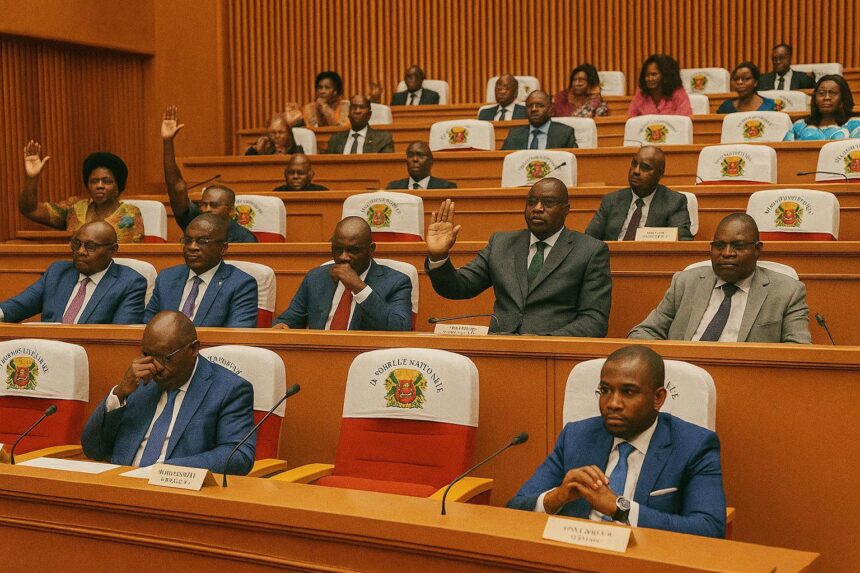Legislation Signalling Ecological Resolve
The lower chamber of Congo-Brazzaville’s Parliament has unanimously endorsed the statute creating the National Environment Agency, a public administrative body mandated to slow biodiversity erosion and safeguard living conditions. Minister Arlette Soudan-Nonault framed the agency as “the operational arm of our 2023 Sustainable Environment Act”, insisting that the instrument transforms political intent into day-to-day regulatory vigilance. Her wording, echoed in the Assembly’s verbatim record, underscores a shift from declaratory ambitions to institutional praxis.
- Legislation Signalling Ecological Resolve
- Convergence with Global Norms on Climate and Biodiversity
- Strengthening Fiscal Probity through Magistrate Statutes
- Parliamentary Modernisation for Bicameral Coherence
- Intersecting Trajectories of Sustainability and Governance
- Implementation Hurdles and the Diplomacy of Capacity
Convergence with Global Norms on Climate and Biodiversity
Beyond domestic symbolism, the agency consolidates Brazzaville’s adherence to the Paris Agreement, the Convention on Biological Diversity and the 2019 Brazzaville Declaration on the tropical forest basin (UNEP 2024). The 1991 environmental act, drafted for a markedly different industrial landscape, offered neither a harmonised permitting regime nor penalties proportionate to contemporary ecological risks. The new framework, however, empowers inspectors to issue legally binding compliance orders, an authority calibrated to attract climate finance while shielding fragile ecosystems along the Congo River corridor.
Experts in regional governance view the timing as strategic. According to a senior analyst at the Central African Forest Initiative, “investor sentiment is increasingly contingent on clear enforcement pathways; the ANE offers precisely that leverage.” Such alignment may facilitate access to Article 6 carbon-market mechanisms, a prospect already flagged by the African Development Bank in its 2023 country outlook.
Strengthening Fiscal Probity through Magistrate Statutes
A parallel legislative package confers a dedicated status on magistrates of the Court of Accounts and Budgetary Discipline, refining both ethical codes and conditions of service. Justice Minister Aimé Ange Wilfrid Bininga portrayed the statute as a fulfilment of Article 162 of the 2015 Constitution, articulating safeguards ranging from tenure security to post-retirement incompatibilities. By tightening deontological obligations, the reform seeks to elevate the Court’s credibility ahead of an anticipated uptick in public-private partnerships linked to infrastructure corridors.
Regional observers note that similar moves in Rwanda and Côte d’Ivoire have correlated with improved sovereign-risk assessments (Moody’s 2023). In this light, Brazzaville’s initiative may strengthen negotiations with multilateral lenders at a moment when fiscal space remains narrow, yet investment appetites in energy and logistics are rising.
Parliamentary Modernisation for Bicameral Coherence
Complementing the substantive reforms is a procedural recalibration of Parliament itself. Deputies approved revisions to the rules governing full Congress sessions and the mixed joint committee, introducing electronic voting and codifying formulaic language surrounding debate closures. These seemingly technical adjustments respond to the constitutional imperative that both chambers adopt identical texts, a safeguard against legislative gridlock that has occasionally slowed budget cycles.
By formalising dispute-resolution mechanisms within the joint committee, lawmakers also reduce the likelihood of constitutional referrals to the Supreme Court, thereby shortening the legislative gestation period. For diplomats monitoring governance indicators, such streamlining hints at a polity increasingly conscious of institutional efficiency as a soft-power asset.
Intersecting Trajectories of Sustainability and Governance
Taken together, the four enactments disclose an integrated philosophy: environmental stewardship, fiscal probity and procedural clarity are treated as mutually reinforcing. The government’s current National Development Plan explicitly lists sustainable forestry, tourism and agri-business as growth drivers; each hinges on predictable regulation backed by credible oversight. In practice, the ANE’s environmental audits will feed data to the Court of Accounts when budgetary allocations target conservation projects, closing a loop that critics once described as porous.
International partners appear receptive. A recent communiqué from the French Development Agency notes that “the institutional bundle adopted in Brazzaville provides reassurance that project financing will be matched by accountable implementation”. Such expressions of confidence, diplomatic though they may be, often precede concessional lending windows.
Implementation Hurdles and the Diplomacy of Capacity
Candid officials acknowledge that promulgation alone will not guarantee impact. Recruiting specialised magistrates, financing eco-monitoring equipment and synchronising databases across ministries will test administrative bandwidth. Yet Congo-Brazzaville enters this phase with growing technical partnerships: the United Nations Development Programme has pledged expertise for digital platforms, while the Central African Forest Observatory is expected to share satellite imagery analytics (UNDP 2024).
Viewed from a diplomatic vantage, the reforms extend an invitation to constructive engagement rather than a mere declaration of intent. The calibrated language of the bills, the consultative process that preceded them and the relative absence of partisan acrimony suggest that Brazzaville understands its credibility stakes in a crowded field of climate-conscious, capital-seeking nations. Success will depend less on the text’s elegance than on sustained inter-institutional cooperation—a terrain where friendlier external scrutiny could serve as both compass and catalyst.





















